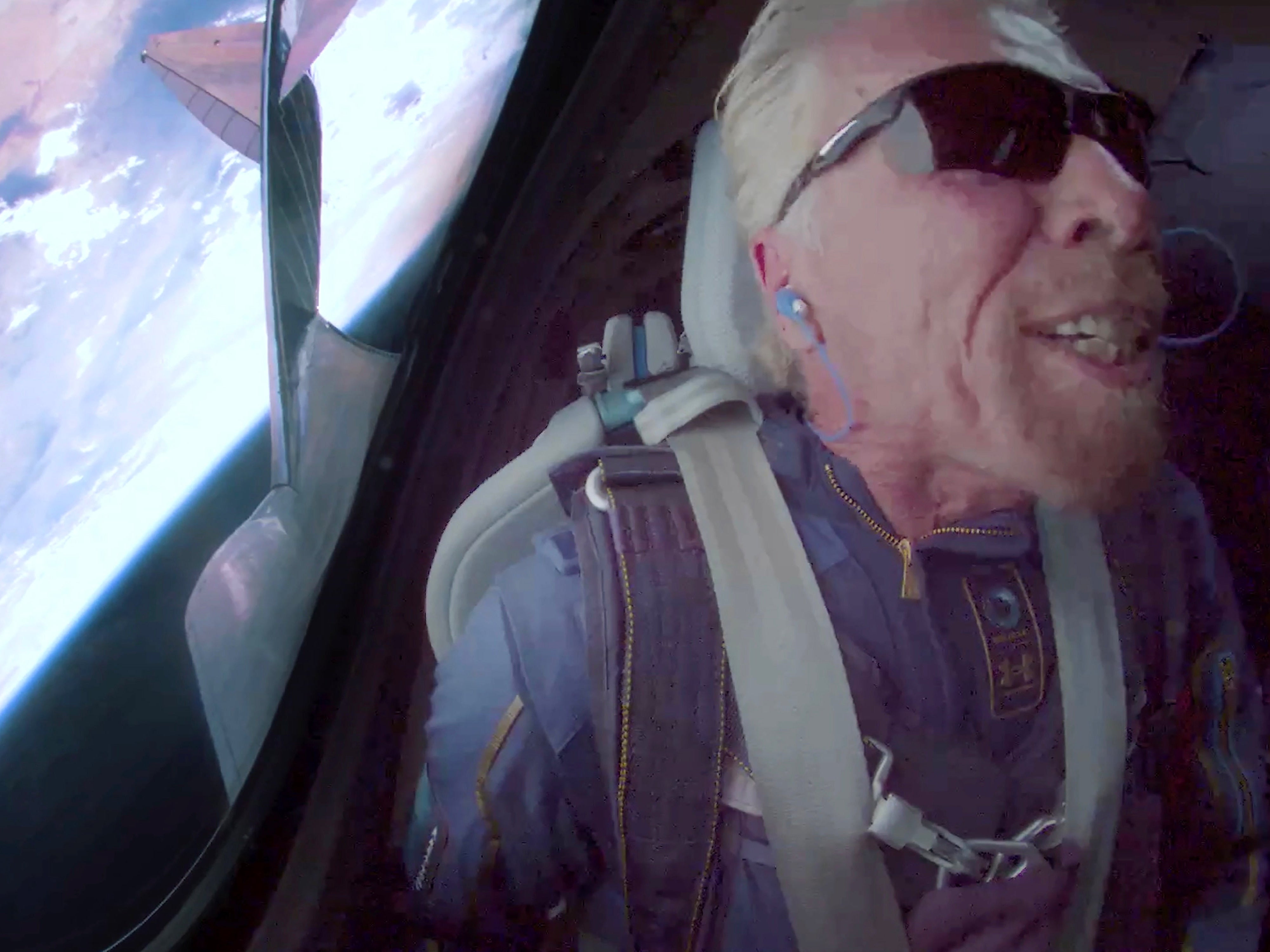Billionaires racing to space can’t escape reality of the climate crisis
Space jaunts by Jeff Bezos and Sir Richard Branson are hard to justify in an era of escalating climate impacts, experts tell Daisy Dunne


As much of the world battled extreme weather events this week, billionaire Jeff Bezos was preparing to blast into space on the first crewed flight of his rocket ship New Shepard.
Built by Mr Bezos’s firm Blue Origin, the ship is designed to cater for a growing demand for private trips to space. It lifted off on Tuesday at 2pm BST from a private launch site near Van Horn, Texas.
Mr Bezos is one of several billionaires battling to pioneer space tourism for the ultra-rich. Earlier this month, Sir Richard Branson “fulfilled a childhood dream” by making it to the edge of space on board Virgin Galactic’s rocket plane VSS Unity. SpaceX’s Elon Musk also has plans to take civilians into space as early as this year.
Many have questioned whether the dash for space tourism – and the emissions caused by the energy-intensive infrastructure it requires – is justifiable in a world facing rapidly worsening climate and nature crises.
“It doesn’t make sense to me,” says Prof Paul Peeters, a researcher of sustainable tourism and transport at Breda University of Applied Sciences in the Netherlands.
“We are really struggling to cope with climate change, both in terms of solving the problem and in terms of adaptation – you can see that with the wildfires burning entire villages [in Canada],” he tells The Independent.
“So to cause more climate change just for a few minutes of fun, I find that a bit difficult.”
“To start this new kind of tourism when we are in the middle of an environmental crisis; the timing is unfortunate,” adds Annette Toivonen, a lecturer at Haaga-Heila University of Applied Sciences in Finland and author of a book on sustainable space tourism.
Virgin Galactic is staying tight-lipped about the climate cost of a trip on VSS Unity. A spokesperson has suggested that the carbon footprint of flying in Unity is the “equivalent to a business flight from London to New York”. (A person travelling on a business ticket between London and New York causes the release of around 1.7 tonnes of CO2 – roughly the same emissions created by the average person in Morocco over the course of a year).
However, the company refused to reveal the emissions caused by a flight when asked by The Independent.
Blue Origin has publicly boasted that its rocket is greener than Virgin Galactic's VSS Unity. This is because New Shepard uses a liquid hydrogen and oxygen rocket engine, which Blue Origin claims has a smaller climate impact than traditional methods. However, the burning of the fuels used by New Shepard still causes greenhouse gases to be released. The Independent asked a Blue Origin spokesperson to provide information on the emissions caused by a flight on New Shepard.
Though the emissions caused by one trip on VSS Unity or New Shepard are unlikely to be large enough to threaten climate targets, Sir Richard’s mission to “make space accessible for all” could come at a higher cost. Around 600 individuals have reportedly paid deposits on tickets to travel on VSS Unity, which cost up to £180,000 ($250,000).
The costly tickets will only be accessible to the ultra-rich – who already account for the vast proportion of travel emissions associated with tourism, Prof Peeters adds.
A report released in March found that a small minority take the lion’s share of flights across countries with the highest aviation emissions. In the UK, almost 70 per cent of flights are taken by just 15 per cent of the population. In the US, just 12 per cent of the population take two-thirds of all flights.
“There’s a huge range in carbon footprints associated with tourism,” he says. “Space tourism could make that even worse.”
The rush to conquer space tourism appears to be at odds with the billionaires’ promises to tackle the climate crisis, he adds.
Mr Musk and Mr Bezos have both pledged to fund research into ways to remove CO2 from the atmosphere. Sir Richard launched a similar challenge in 2007, only to abandon it 12 years later after no company could win the prize.
“If you claim to play a role in mitigating greenhouse gas emissions, it’s hard to follow that you would also pursue [space tourism]” says Prof Peeters.
This article was updated on 20 July to reference the launch of Blue Origin’s New Shepard

Join our commenting forum
Join thought-provoking conversations, follow other Independent readers and see their replies
Comments